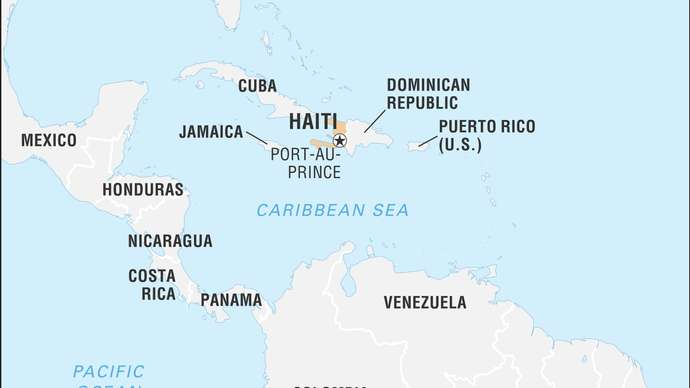International Relations
Assasination of Haiti’s President
- 10 Jul 2021
- 7 min read
Why in News
Recently, Haiti’s President Jovenel Moise was assassinated at his private residence in Port-au-Prince, Haiti.
Key Points
- About Haiti:
- Haiti is a country in the Caribbean Sea that includes the western third of the island of Hispaniola and such smaller islands as Gonâve, Tortue (Tortuga), Grande Caye, and Vache. The capital is Port-au-Prince.
- Its population is almost entirely descended from African slaves, won independence from France in 1804, making it the second country in the Americas, after the United States, to free itself from colonial rule.
- It is the world’s first independent Black-led republic.
- The nation underwent about two centuries of Spanish colonial rule and more than a century of French rule.
- Over the centuries, however, economic, political, and social difficulties as well as a number of natural disasters have beset Haiti with chronic poverty and other serious problems.
- It is the Western Hemisphere’s poorest country, has a painful history of foreign interventions, economic exploitation and dictatorial rule.
- Recent Instability:
- Haiti’s latest instability revolves around a dispute over Jovenel Moise’s presidency. He was elected in 2016 to a five-year term, but because of contention over election results, he did not take office until the next year.
- Under Jovenel Moise’s administration, the political and economic situation in Haiti further deteriorated.
- Jovenel Moise insisted that it entitled him to another year in power — a claim that Haiti’s opposition rejected.
- In February 2021, when Moïse’s opponents said his term ended, they declared their Supreme Court Judge as interim president. Jovenel Moise called it a coup attempt, and 23 opponents were arrested.
- At the same time there has been a surge in kidnappings, rapes and killings as rival gangs battle each other and the police for control of Haiti’s streets.
- The human rights activists have accused Jovenel Moise’s government of having ties to the gangs.
- So far this year, at least 278 Haitians have been killed in gang-related violence.
- The unprecedented level of violence and subsequent displacements is creating a host of secondary issues.
- Haiti’s latest instability revolves around a dispute over Jovenel Moise’s presidency. He was elected in 2016 to a five-year term, but because of contention over election results, he did not take office until the next year.
India- Haiti Relations
- Political:
- India’s relations with Haiti have been friendly, though interaction between the two countries has been limited.
- India established diplomatic relations with Haiti in September 1996. Haiti appointed a Honorary Consul in New Delhi in October 2014.
- India had sent a 140 member Central Reserve Police Force (CRPF) troop to Haiti on a peace mission under the auspices of the United Nations (UN) in August 1995.
- In October 2008, a 140-member Formed Police Unit (FPU) from India joined the UN’s Stabilization Mission in Haiti (MINUSTAH) to help with international efforts to ensure a safe environment in Haiti.
- The last units of FPU stationed in Haiti left in July 2019 on completion of assignment.
- At the multilateral level, the Government of Haiti has supported Indian candidatures in the elections for various international organizations, including elections for International Court of Justice (ICJ), UNESCO, International Maritime Organization and World Customs Organization (WCO) in the recent past.
- Commerce:
- India’s trade with Haiti is small but Indian exports to the country have been growing in recent years.
- Two way trade between the two countries was at USD 93.10 million by the end of 2018-19.
- The main items of exports to Haiti are pharmaceutical goods, textiles, rubber products, cosmetics, and plastic and linoleum products.
- India has granted duty free access to Haitian products as a special gesture to a Least Development Country.
- Educational:
- India has been offering assistance to Haiti under Indian Technical and Economic Cooperation (ITEC) programme.
- The ITEC programme provides for organizing training courses in India, deputation of Indian experts abroad, aid for disaster relief, gifting of equipment, study tours and feasibility studies/consultancy services.
- Haitian diplomats have also been taking advantage of Professional Course for Foreign Diplomats (PCFD) courses at regular intervals.
- PCFD affirms the commitment of India to its friendly countries in sharing the knowledge and expertise acquired in the field of diplomats’ training.
- Haitian illiterate women received training at the Barefoot College in Rajasthan in harvesting solar power.
- India has been offering assistance to Haiti under Indian Technical and Economic Cooperation (ITEC) programme.
- Disaster Relief:
- India donated medicines worth USD 50,000/- as humanitarian assistance to Haiti for the damage caused by Hurricane Noel in November 2007.
- Another USD 5 million relief assistance was given in January 2010. A relief of USD 5,00,000 annually for three years till 2011 was also provided.
- India also provided emergency financial aid of USD 2,50,000 to Haiti in the aftermath of Hurricane Mathew in October 2016.
- Indian Community:
- Indian community in Haiti is small. It comprises approximately 70 members. Almost all of them are Indian passport holders.
- Several of them are professionals, – doctors, engineers, technicians. Some are into private businesses.







